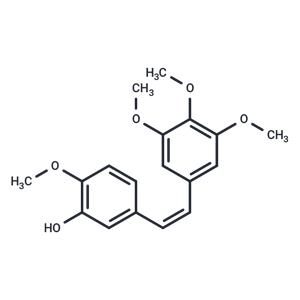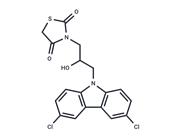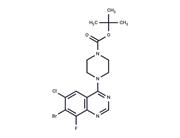| Name | Combretastatin A4 |
| Description | Combretastatin A4 (CA4) is a microtubule-targeting agent that binds β-tubulin (Kd: 0.4 μM). |
| Cell Research | MDA-MB-231, A549, and HeLa cells are grown in DMEM medium (115 units/mL of penicillin G, 115 μg/mL of streptomycin, and 10% fetal bovine serum). Cells are seeded in 96-well plates (5000 cells/well) containing 50 μL of growth medium for 24 h. After medium removal, 100 μL of fresh medium containing individual analogue compounds at di?erent concentrations is added to each well and incubated at 37 ℃ for 72 h. After 24 h of culture, the cells are supplemented with 50 μL of analogue compounds dissolved in DMSO (less than 0.25% in each preparation). After 72 h of incubation, 20 μL of resazurin is added for 2 h before recording ?uorescence at 560 nm (excitation) and 590 nm (emission) using a Victor microtiter plate ?uorimeter. The IC50 is de?ned as the compound concentration required to inhibit cell proliferation by 50% in comparison with cells treated with the maximum amount of DMSO (0.25%) and considered as 100% viability.(Only for Reference) |
| Kinase Assay | Competitive binding assay using LC-MS/MS: Colchicine (1.2 μ M) is incubated with tubulin (1.3 mg/mL) in the incubation bu?er (80 mM PIPES, 2.0 mM MgCl2, 0.5 mM EGTA, pH 6.9) at 37℃ for 1 h. Varying concentrations (0.1 ? 125 μ M) of Combretastatin A4 are used to compete with colchicine originally bound to tubulin. After incubation, the ?ltrate is obtained. The ability of the analogue to inhibit the binding of colchicine is expressed as a percentage of control binding in the absence of any competitor. |
| In vitro | In NT2 and MDA-MB-231 breast tumor models, Combretastatin A4 (100 mg/kg, i.p.) significantly reduced lipid R1 levels and decreased pO2 as measured by Electron Paramagnetic Resonance Oxygen Imaging. Additionally, Combretastatin A4 (100 mg/kg, i.p.) notably reduced Ktrans in male NMRI mice. |
| In vivo | Combretastatin A4, at a concentration of 1 μM, inhibits microtubule polymerization by 35%, while a concentration of 10 μM nearly completely blocks it. Additionally, Combretastatin A4 effectively inhibits the growth of a variety of cell lines, including MDA-MB-231, Hela, A549, HL-60, SF295, HCT-8, MDA-MB435, OVCAR-8, PC3M, NCI-H358M, and lymphocytes, with respective IC50 values of 2.8, 0.9, 3.8, 2.1, 6.2, 5.3, 7.9, 0.37, 4.7, 8, and 3.2 nM. |
| Storage | Powder: -20°C for 3 years | In solvent: -80°C for 1 year | Shipping with blue ice. |
| Solubility Information | Ethanol : 31.6 mg/mL (100 mM)
DMSO : 45 mg/mL (142.25 mM)
|
| Keywords | inhibit | Microtubule/Tubulin | CA 4 | Combretastatin A4 | Combretastatin A-4 | Inhibitor | Combretastatin A 4 | CA-4 |
| Inhibitors Related | Flubendazole | Mebendazole | N-Phenylbenzylamine | 4-Isopropoxybenzoic acid | Oxfendazole | Docetaxel | Thiabendazole | Methylene Blue | Methylene Blue trihydrate | Griseofulvin | Paclitaxel | 4'-Demethylepipodophyllotoxin |
| Related Compound Libraries | Anti-Tumor Natural Product Library | Bioactive Compound Library | Drug Repurposing Compound Library | Natural Product Library | Natural Product Library for HTS | Anti-Cancer Active Compound Library | Anti-Cancer Drug Library |

 United States
United States



